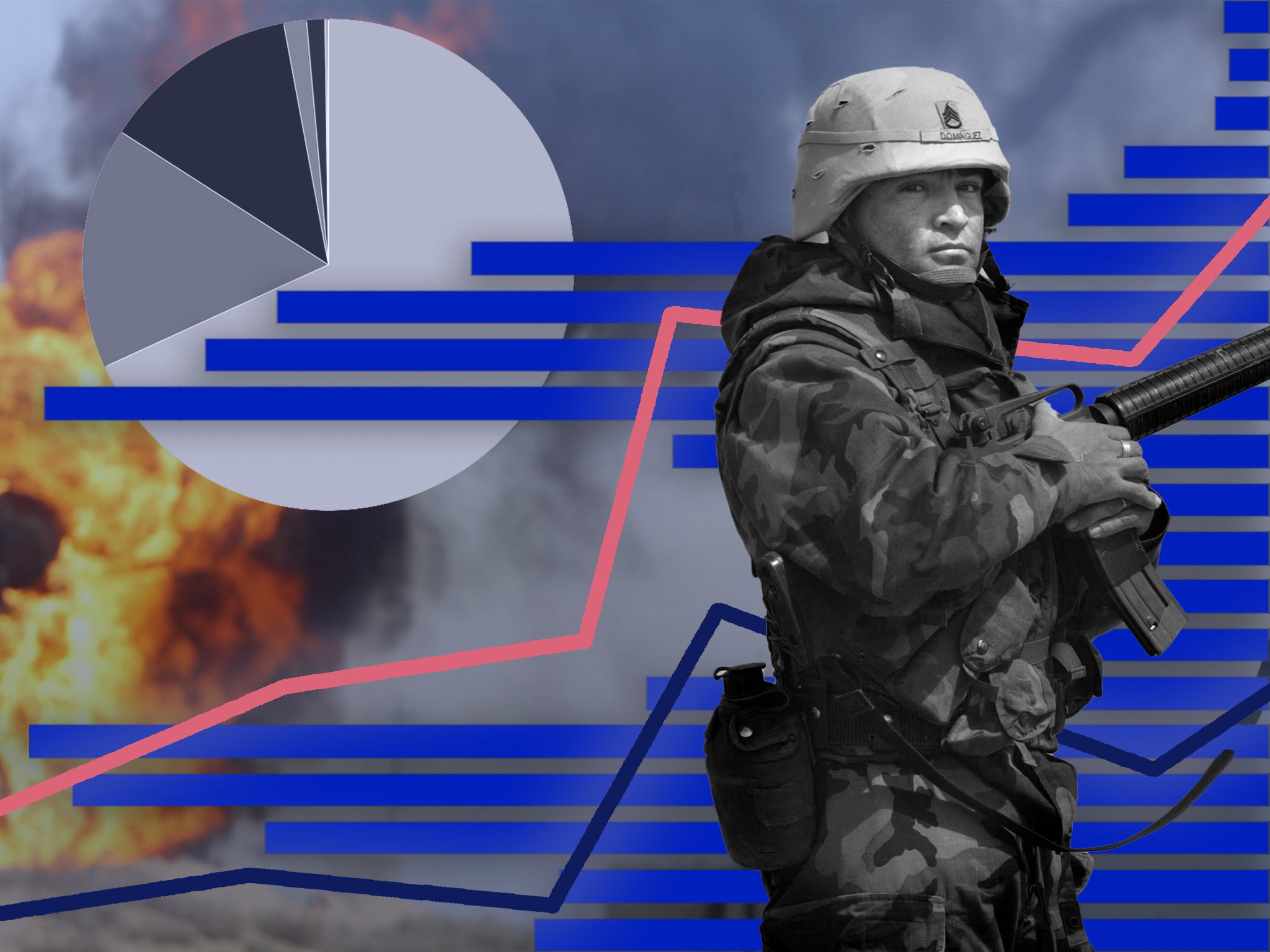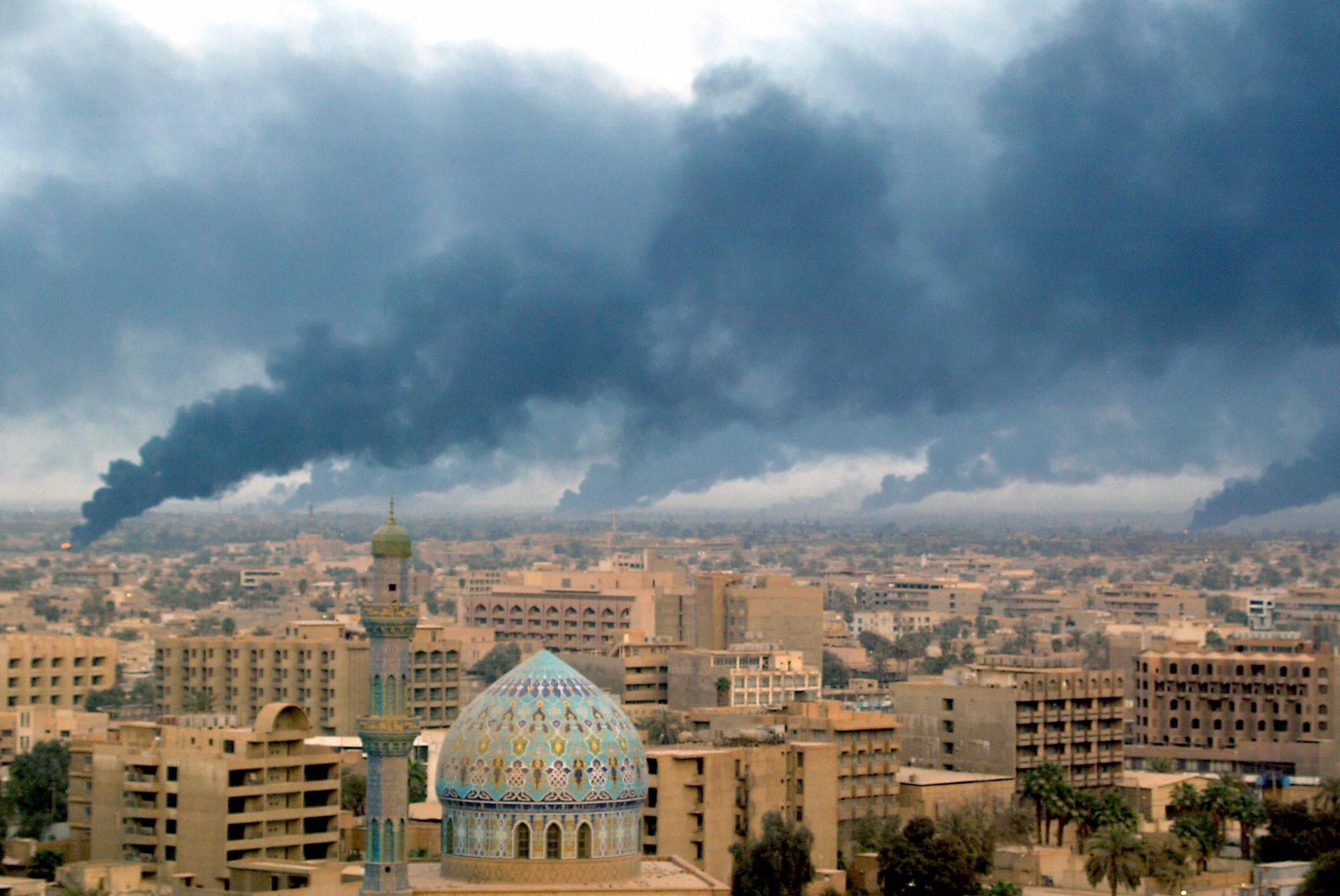Twenty years on: The shocking numbers behind the Iraq war
Trillion-dollar war. Hundreds of thousands dead. Zero weapons of mass destruction. Maryam Zakir-Hussain reports on the numbers behind the war

Your support helps us to tell the story
From reproductive rights to climate change to Big Tech, The Independent is on the ground when the story is developing. Whether it's investigating the financials of Elon Musk's pro-Trump PAC or producing our latest documentary, 'The A Word', which shines a light on the American women fighting for reproductive rights, we know how important it is to parse out the facts from the messaging.
At such a critical moment in US history, we need reporters on the ground. Your donation allows us to keep sending journalists to speak to both sides of the story.
The Independent is trusted by Americans across the entire political spectrum. And unlike many other quality news outlets, we choose not to lock Americans out of our reporting and analysis with paywalls. We believe quality journalism should be available to everyone, paid for by those who can afford it.
Your support makes all the difference.Twenty years have passed since George W Bush vowed to save the West from Saddam Hussein’s stockpile of weapons of mass destruction.
Backed by the UK and a coalition of international forces, on 20 March, 2003, the US launched a “shock and awe” bombing campaign which President Bush triumphantly declared as “mission accomplished” just weeks later on 1 May.
But the war was far from over, weapons of mass destruction were never found, violence raged for years and the aftermath of the conflict is felt to this day.
Here The Independent takes a deep dive into the numbers that show the true cost of war two decades on.

Cost of war
£8.2 billion – The total audited cost of UK operations in Iraq since 2003, according to an audit carried out by the Ministry of Defence in January 2015.
£3 billion – Amount the government set aside to cover “the full costs of the UK‟s military obligations” in Iraq in the 2003 Budget.
The UK’s spending on the Iraq war between 2002 and 2008:
$1.79 trillion – The total spent by the US on the wars in Iraq and Syria, according to estimates published by the Costs of War project. This figure includes Pentagon and State Department spending, veterans’ care and the interest on debt financing the conflicts.
$2.89 trillion – Total US spending when including projected veterans’ care through to 2050.
125 – The number of days the US campaign plan had envisaged it would take to destroy Iraqi forces and topple Saddam Hussein’s regime.
8 - The number of years the war lasted.
Iraqi civilian deaths
209,982 – The number of Iraqi civilians killed between 2003 and 2022, according to figures from Iraq Body Count (IBC).* In 2006 alone, 29,526 civilians were killed, making it the bloodiest year for the Iraqi civilian death toll.
600,000 – The medical journal The Lancet’s estimation of the scale of Iraqi civilian deaths.
20,218 – The number of civilians killed in 2014 due to Isis attacks as the group seized towns across the country, resulting in US president Barack Obama announcing air strikes against the group in Iraq.
Iraqi civilians killed each year since the start of the war:
Coalition and Iraqi troops killed
4,598 – The number of US troops killed in Operations Iraqi Freedom, New Dawn and Inherent Resolve between March 2003 and August 2021.
179 – The number of British Armed Forces personnel or Ministry of Defence civilians killed since March 2003. 136 of these were killed as a result of hostile action.

53 – The number of fatalities suffered by UK Armed Forces in the Gulf in 2003 alone, according to a MoD update in December of the same year.
139 – Deaths of troops from other Coalition countries between March 2003 and August 2021.
3,650 – The number of US contractors killed in Iraq between March 2003 and August 2021.
48,719 - The number of Iraqi national military forces and national and local police forces killed in the same period.
Deaths in Iraq:
*Opposition fighters in the chart refers to Iraqi soldiers, also called militants, resisting the US invasion and occupation.
International troops deployed
46,150 – Number of UK troops deployed to Iraq in 2003.
141,640 – Number of UK troops deployed between 2001 and February 2014.
Approximately 150,000 US soldiers were deployed in 2003. This number increased to its peak in 2007 of over 170,000 soldiers, three years after Bush claimed ‘Mission Accomplished’ in Iraq on 1 May 2003.
38 – The number of countries, including the US and UK, who formed the Coalition forces fighting against Iraq from 2003.
Soldiers deployed from the different allied countries:
Displaced people
3.9m – The number of Iraqi refugees who fled between 2003 and 2016. Of these 2m fled the country and 1.9m were displaced within Iraq.
Chilcot Inquiry
£9m – Cost of the Chilcot report on Britain’s involvement in the Iraq war. The report found a series of major blunders by the British intelligence services that produced ‘flawed’ information about weapons of mass destruction.
129 – the number of witnesses called to give evidence
7 – the number of years it took for the Chilcot inquiry to take place
*IBC records the violent deaths that have resulted from the 2003 military intervention in Iraq. The deaths include those that have been “caused by US-led coalition and Iraqi government forces and paramilitary or criminal attacks by others”.
The numbers do not account for those who were killed as a consequence of war destroying society’s healthcare systems, resulting in just as many deaths from malnutrition and disease.
Join our commenting forum
Join thought-provoking conversations, follow other Independent readers and see their replies
Comments